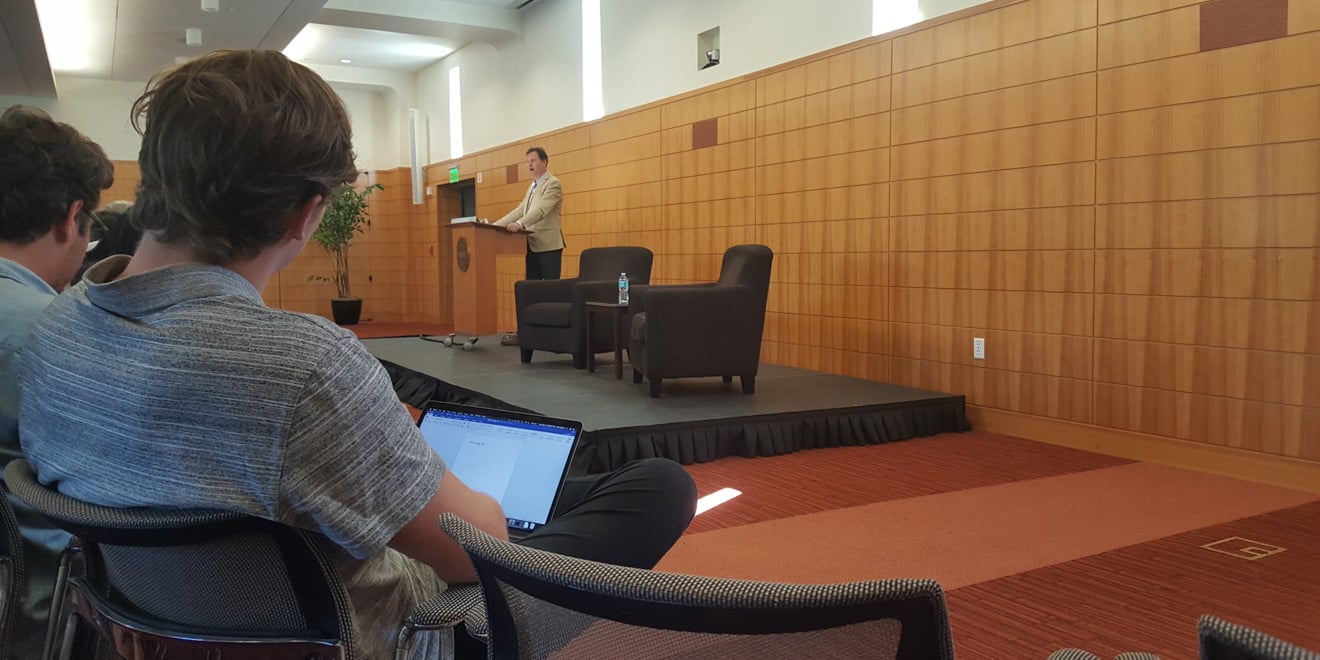On Tuesday at the Freeman Spogli Institute (FSI), Former Deputy Prime Minister of the United Kingdom Sir Nicholas Clegg addressed the June 2016 referendum that initiated Britain’s exit from the European Union (EU).
Currently, the UK is set to leave the EU on 30 March 2019. Clegg, who served in his position from 2010 to 2015, spoke on the UK’s troubled past with the EU and what the decision for Britain to leave the European Union would mean for the future of the UK and Europe.
Domestic causes of anti-establishment and anti-EU sentiment
Despite being a vocal opponent of UK’s withdrawal from the EU — his most recent book is titled “How to Stop Brexit” – Clegg began his talk by recalling sentiments he noticed before the vote, which he said he viewed as very valid frustrations that would ultimately produce “Brexit.”
“‘You can’t expect me to tick a box [on the referendum] that says ‘remain’ as if I want everything to remain the same,’” Clegg said, demonstrating the sentiment of someone he saw as inclined to vote in favor of Brexit. “‘I’m working longer hours than I ever have…and yet I’m going around [with] less money for my kids, less money for my family.’”
Clegg occupied his post as deputy prime minister during a time when the United Kingdom was recovering from a deep recession following the 2008 financial crisis. He attributes much of the “eruption of discontent,” which he largely sees as a homegrown movement, to the pain and anger from echoes of 2008’s economy.
“It is almost impossible to exaggerate how economically and politically significant the 2008 financial crisis was,” Clegg stated. “It was only a matter of time before voters turned on the status quo.”
Britain’s difficult past with the EU
Clegg described Britain’s unique relationship with the EU, a historical tension that he views as a large contributor to the movement for Brexit that is often overshadowed by the domestic and economic causes.
“It might be hard [for those in the United States] to understand quite how fragile and shallow the roots of European identity proved to be in the United Kingdom,” Clegg noted. “The referendum pulled up those roots.”
For other countries in the European Union – Clegg specifically mentioned the founding members, Belgium, Netherlands, Luxembourg, France, Germany and Italy – the EU “symbolizes and entrenches freedom,” particularly in the face of the Soviet Union’s communism.
This emotional significance of international organization of freedom after war, according to Clegg, also holds for many of the other member countries who joined since the beginning of the European Union in the late 20th century.
“For different member states at different times,” Clegg said, “they converge on a powerful emotional narrative which unites and marries their own identity with peace after war, democracy after fascism.”
Clegg then highlighted the unique contrast to this pattern that Britain poses. The UK, despite being an economic power in Europe, was not involved in the 1950s initial treaties that were eventually incorporated into the EU. Even after joining the organization after much back-and-forth, the UK kept its own currency instead of adopting the euro with the rest of the EU member states.
“Britain is unique by contrast for never having, and never having had, a positive emotional narrative about joining the EU.,” Clegg said.
What Brexit means for Britain’s transatlantic diplomacy
Clegg also mentioned his concerns regarding the deterioration of the “special relationship” between the UK and the United States, an unofficial term first coined by Winston Churchill in 1946 for the diplomatic and political relations between the countries.
“The United Kingdom is now simultaneously losing its footing on both sides,” Clegg said. “It’s losing in Europe, by removing itself from the EU, and losing in America because the American people have chosen a president that is not interested in sustaining traditional forms of Atlanticism.”
Clegg had earlier alluded to the relationship between the Brexit movement and the election of Trump in America. He described what he sees as Britain’s diminishing utility to Washington under the Trump administration as its status deteriorates in Europe.
The future of referenda and the optimism in the fight against Brexit
In his talk, Clegg also addressed the pushback on the use of referenda. Many in Britain want to get rid of the direct vote, which allows the entire electorate to vote on a proposal. Clegg suggested that this may be too extreme, but also believes referenda should be held with greater forethought and more checks and balances.
For Clegg, this includes extending the voting franchise to 16- and 17-year olds, requiring a quorum, or a minimum number, of voters and a way to ensure that the margin of victory is more decisive than 51 percent.
51.9 percent voted to leave the EU in the Brexit referendum.
Sir Nick Clegg ended his talk by expressing his optimism in the waves of advocacy against Brexit. While acknowledging that Britain’s withdrawal from the EU is very likely, he said that there is about a 20 percent – and rising – chance of a change in course.
“With a bit of ingenuity, a bit of imagination, a bit of generosity, it is still possible to avert the worst of Brexit,” Clegg stated. “It is still possible to give young people the future they crave.”
Contact Elena Shao at eshao98 ‘at’ stanford.edu.
